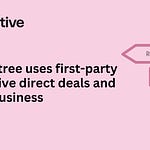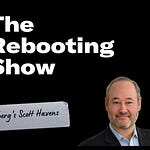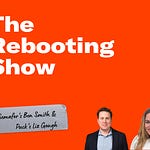Subscribe on Apple Podcasts and Spotify
Like just about everyone, I’m both horrified by the Russian invasion of Ukraine and in awe of the resistance of the Ukrainian people. Ukraine is an inspiration to the rest of the world. In places like the United States, we fail to appreciate the staggering advantages we have just by dint of where and when we were born. In September, I visited Ukraine to speak at a conference to build sustainable, independent journalism in the region. This is a hard task in a country with complicated politics where publications are often controlled by oligarchs and political parties, and the economy is far smaller. The Ukrainian people I met were all first rate and incredibly generous. They’re also brave. Consider helping by giving to one of these vetted programs, as well as a fundraising for the Kyiv Independent, an independent English-language publication, and this one for other independent media in Ukraine.
A couple years ago, then-Bleacher Report CEO Howard Mittman coined a neat phrase for the end of an era of lightweight content produced for algorithms: Need vs Feed. In the next era of digital publishing, you want to be on the Need side.
“When I think about publishing, I think about purpose-driven versus mission,” he said on this week’s episode of The Rebooting Show. “Purpose-driven publishing is about ad dollars and collecting affiliate revenue. It's about filling a gap that consumers have based off of a Google search or social media. Mission-driven is where I’m interested in now. You see that in areas like the environment and in news.”
Howard spent a dozen years at Conde Nast, occupying top business roles for titles like GQ and Wired. I’ve always known him to be thoughtful about where the media business is going, so we had a discussion about the dangers of going overboard on subscriptions, why now just might be the time for new entrants to address local news and why the betting gold rush for sports publishers might soon taper off.
Hope for local news
If there’s a sector of publishing that could use a comeback, it’s local news. The industry has been decimated over the past two decades, with big-city newspapers shrunken and news desserts dotting the map. But new entrants are emerging.
“We live in a world where all politics are still local, but all news coverage is national. I hope there's a compromise. I suspect we're getting closer to finding it. I don't know that local journalism is always going to be defined in its most traditional form. It may not simply be about local news and information. And maybe local journalism is decreasing the proximity between the content creator and the reader. If you look at the podcast system, how many have evolved into live events? That reduces the friction between the creator and the user. Those direct connections people will pay for in pretty intense ways – if you have the right talent, if you have the right topic matter, the right sort of credibility.”
The case for ads
The pendulum in the publishing business has swung far away from ads and firmly in the direction of subscriptions. Often this is presented as an either-or proposition when it rarely is.
“Turning off one side or the other and going all in one way or the other doesn't feel to me to be the best recipe. If we're launching something today, I would have you on subscription and smart targeted ads that work, I wouldn't start jamming in pre-roll [video ads]. I wouldn't be arguing with my content team about the size of the banners above the fold. But I do think elegant sponsorship has to be a part of it because you're just leaving too much money on the table.”
Sports publishing’s pivot to gambling
The sports publishing sector got a stimulus package of its own when states began to legalize sports gambling. The scramble to acquire customers by deep-pocketed companies like DraftKings, FanDuel, Penn and others has led to some eye-popping deals for sports publishers. But all gold rushes eventually come to an end.
“Land grabs die. The valuations have come back down on some of these companies. The reality of most traditional media companies. Is that they're not set up to deliver lower funnel conversions and those customer acquisition costs are very high. What we'll find is that this first wave will be those enormous three-to five-year deals. I suspect most of them will not get renewed, not to the same levels where they're at [now]. The market will have matured. And so in this early land grab stage, a betting company is focused on the tip of the spear, getting people who are already betting illegally to bet legally, then you move into sports fans who don't bet, then it'll move to non-sports fans. In this first wave, you're just doing everything you can to get noticed.”
Growth hacking isn’t very new
The internet didn’t invent the scramble for large audiences, no matter how they were obtained. Buyers wanted to see the big numbers – and they often didn’t check them out.
“If you buy a magazine today, the first thing you’ll do is evaluate the health of the subscription file. You might need to right size the subscription base from 2 million to 200,000, which is the range it probably should be. Why did these magazines get that large? It’s well beyond what the readership should be. It’s not because the magazines don’t have quality. It’s not because there aren’t a fair amount of people who want to read them. It’s because the easiest way to juice your numbers year over year, if you CPMs were flat, was to increase your subscriptions. It’s been 20 years since any agency person really understood how to read an [Audit Bureau of Circulation] statement.”
The unvirtuous circle
Publishers chased scale not because of their egos but because that’s how the industry has long been structured. This created misaligned incentives that often worked against publishers with smaller audiences but deep ties to them.
“It's an unvirtuous circle. The client procurement officers, primarily at big companies, have squeezed agency margins, so agencies have had to go and find other ways to make money. That's how trading desks evolved. They can’t staff these accounts like they used to. There’s nobody there. When I first started selling ads in a magazine, there were multiple assistant planners. You had big teams for single accounts. [Agencies] can’t afford to do that. What then happens is nobody can take the time to really understand the products they’re buying. This is where the RFP process comes in. It’s an easy way to keep [publishers] at bay. It’s a hell for a big account run by three or four people that used to be run by eight or 10 people to just buy the five biggest [publishers]. It creates less incentive for media brands to present themselves in the right way. This unvirtuous circle has everyone to blame. The net result is that smaller, focused publishers that have stronger audiences cannot get the mindshare that’s required to make the connections they need to grow. You get a lot of the same.”
Pumping the brakes on crypto hype
The meme “web3 solves this” is popular for a reason: Crypto’s boosters rarely take a breather from their boosting. Often, new technologies are treated as a savior, even before tangible use cases emerge. Crypto is no different in that regard.
“A lot of folks believe it to be a panacea for too many things. We have to wait to figure out where it’s really going to be applied. I don’t believe that tokenizing and writers creating DAOs will be the future of media and publishing companies. Some of that will happen. I'm not against it. I think we will absorb and use and greatly benefit from some of the very good things that it can do. We’re just starting to understand some of the downsides of it. Just like every other life cycle, it’s going to have to run its course.”
Send me a note with feedback and people you’d like to hear from on The Rebooting Show. My email is bmorrissey@gmail.com. If you’re interested in sponsoring The Rebooting, check out the sales kit and get in touch.















Howard Mittman on 'mission-driven' publishing